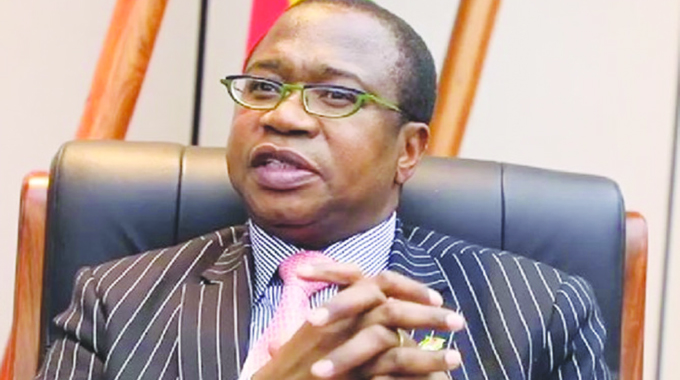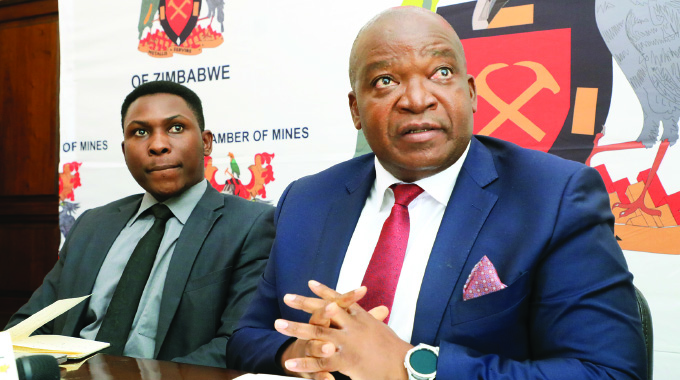Govt outlines measures to tame inflation

Blessings Chidakwa Herald Reporter
THE near convergence of the auction average and the interbank rate was maintained yesterday but for the first time the auction average at $308,5201 was above the interbank rate of $301,4994, although only by 2,3 percent, as the Government announced a cocktail of measures to tame exchange rate fluctuations and curb speculative behaviour.
Finance and Economic Development Minister Professor Mthuli Ncube said the Government is now paying contractors for major infrastructure projects half in US dollars and half in local currency, with the local currency payments staggered to avert the temptation to try and convert a solid local currency payment on the black market.
The two legal methods of buying foreign currency, whether on auction for larger concerns and the interbank market for willing buyers and sellers through the banks, have been in close alignment now for three weeks and while rates are still rising, the rate of increase is not nearly so severe.
The Government wishes to maintain that alignment, effectively creating a single official exchange rate driven by pure market forces.
Fielding questions after the weekly Cabinet meeting in Harare last night, Prof Ncube said the main reason why the exchange rate was moving upwards was due to speculative issues that present themselves on the market.
But the Government is taking steps to make sure that in its financing of infrastructural projects necessary for development, it does not contribute to economic volatility and inflation.
Government has embarked on major infrastructure projects like road rehabilitation encompassing the Beitbridge-Harare-Chriundu highway, dam construction and pipeline laying, the Hwange refurbishment of units 7 and 8, Beitbridge border post refurbishment, airports rehabilitation among others.
On most of these projects it has contracted both local and foreign companies who are paid large sums in Zimbabwe dollars which they offload on the parallel market triggering exchange rate volatility.
“What is driving the exchange rate is speculative behaviour and some actions of monopolies that we have seen. We have two critical steps; one is to pay contractors using the following formula: 50 percent in US dollars and then 50 percent in Zimbabwe dollars,” Prof Ncube said.
“The second action is that on the Zimbabwean dollar portion, we spread it out. Not spread it out all at once, we spread it out in bits and pieces to make sure it doesn’t find its way as a lump sum into the parallel market.”
The Finance Minister said the Government had taken those actions and established a liquidity committee drawn from his ministry and the Reserve Bank of Zimbabwe to monitor and manage the liquidity of the entire economy.
“It is our desire to make sure that the interbank window, the willing-buyer willing-seller, and the auction window are aligned. We sought to increase the transaction costs for transacting in hard currency from the usual two percent to four percent in hard currency.
“We have also endeavoured to deal with speculative behaviour by making sure we do away with the movement of monies and transactions within third party accounts or accounts involving trust accounts. We are going to tighten that window,” Prof Ncube said.
Speculative behaviour by some rogue elements, who borrow from banks, spin the money and collapse the local currency by offering to pay more for United States dollars so that they pay back less to banks, has contributed to price increases.
This has been worsened by the geopolitical developments in Eastern Europe where Russia is conducting a special military operation in Ukraine, triggering price increases across the world, including in Zimbabwe, as supply chains have been significantly affected.
Zimbabwe has to manage without balance of payments support and Prof Ncube said the country is thus using a hard currency, the US dollar, as one of its transaction currencies yet it is a global currency.
“Any changes that happen in that hard currency globally impact us. What we have seen is that the US dollar has generally strengthened globally since it is at its strongest level since 2002. The US dollar index is at its highest level.
“All that impacts the behaviour in terms of preference for the US dollar versus the Zimbabwean dollar,” he said.
Prof Ncube, however, said as a Government, they need both currencies going forward because the US dollar is what gives the virtual surrogate balance of payment mechanism that Zimbabwe uses in place of international balance of payment support.
As part of price stabilisation moves, the Government has also allowed the importation of some basic goods duty-free for six months by those with free funds to ensure reasonable pricing, a move that can deal with the rising prices.
The products are rice, flour, cooking oil, margarine, maize-meal, sugar, petroleum jelly and salt, milk powder, infant milk formula, tea, toothpaste, bath soap, laundry soap and washing powder.
“Citizens and other concerned individuals can bring in those goods duty free and help ameliorate the upward movement in prices,” Prof Ncube said.
“We have seen the impact since we did that in conjunction with suspending lending within the banking sector. What we did is called macro-credential regulation. An investigation is underway to make sure those who violated the law are brought to book accordingly.”
Some of the measures have already started bearing fruit, and yesterday prices, at least in foreign currency, had started going down marginally following the duty-free imports.
Cooking oil, whose price had shot up to US$7 before the Government’s intervention, is now selling at between US$4 and US$5.
Some rogue retailers who are beneficiaries of the duty-free policy continue to profiteer by pricing their goods exorbitantly.







Comments